Know Before You Go: 4 Urgent Care Tips from a Doctor

You are injured, sick, or hurt, and you have to see a doctor. However, you do not know whether to visit an ER doctor or Urgent Care doctor. There are times when the emergency room is the best option and others when urgent care is, and it can be confusing to know where to go. Before you decide, you best equip yourself with some basic knowledge to ensure a smooth and beneficial visit to the doctor.
Going to the hospital without this know-how results in misinformation and inconvenience. Keep reading and learn about urgent care clinic facts to be on the safe side.
1. Urgent Care Clinics are NOT Emergency Rooms
Urgent care clinics provide healthcare services to people that need immediate care but no emergency conditions or situations. Simply put, never go to the UCC if you (or your loved one) are suffering a life-threatening illness(s). All fatal health problems should be checked and treated in a hospital’s ER, where they have the required staff and equipment.
Urgent care providers handle problems that demand prompt attention but are not terminal. That is, minor and moderate burns, cuts, injuries, sprains, infections, coughs, fevers, and fractures -– to mention a few.
2. Get Ready to Share Medical History
Remember to note down any symptoms so that you do not miss anything. If it is your first time in the clinic, be honest about your medical history. Hence, your urgent care provider will have the basics for an accurate diagnosis — whether it is hereditary conditions, allergies, current prescriptions/medication, or supplements.
Also, bring your insurance card because most clinics accept insurance. Urgent care copays are usually lower than at the ER but higher than a regular doctor’s visit.
3. Avoid Peak-Hour Visits
Did you know that as per statistics, UCCs see an average of three patients per hour? Peak hours vary from clinic to clinic, so when you decide to go, ensure you won’t be incommoded if you had to wait a little longer.
Healthcare services are offered on a first-come, first-served basis. More often than not, you have to wait for nearly an hour, but this time is susceptible to change. Confirming the clinic hours and availability allows you to plan better.
4. Contact Your Primary Care Giver
Even though it is not an appointment with your regular doctor, it is crucial to let them know of your urgent care visit. Additionally, you could give them a copy of your urgent clinic healthcare reports. This information helps them update your medical record for future references.
After your visit, ask if you need a follow-up appointment and consult with your primary healthcare services provider.
Other than emergency room visits and urgent care, you should see a doctor at least once a year. When you visit an urgent care clinic, make sure you are being seen for one acute yet prompt issue and not a chronic one.
At Care Station, our medical professionals and doctors understand that everyone deserves quality medical attention regardless of age or gender. So whenever you seek urgent medical assistance, do not hesitate to visit any of our branches.
